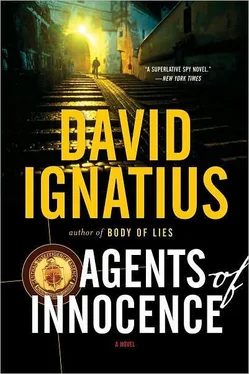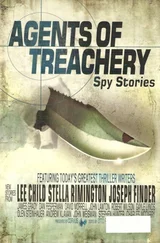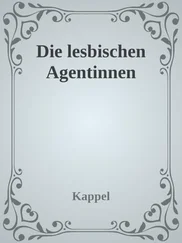David Ignatius - Agents of Innocence
Здесь есть возможность читать онлайн «David Ignatius - Agents of Innocence» весь текст электронной книги совершенно бесплатно (целиком полную версию без сокращений). В некоторых случаях можно слушать аудио, скачать через торрент в формате fb2 и присутствует краткое содержание. Жанр: Шпионский детектив, на английском языке. Описание произведения, (предисловие) а так же отзывы посетителей доступны на портале библиотеки ЛибКат.
- Название:Agents of Innocence
- Автор:
- Жанр:
- Год:неизвестен
- ISBN:нет данных
- Рейтинг книги:3 / 5. Голосов: 1
-
Избранное:Добавить в избранное
- Отзывы:
-
Ваша оценка:
- 60
- 1
- 2
- 3
- 4
- 5
Agents of Innocence: краткое содержание, описание и аннотация
Предлагаем к чтению аннотацию, описание, краткое содержание или предисловие (зависит от того, что написал сам автор книги «Agents of Innocence»). Если вы не нашли необходимую информацию о книге — напишите в комментариях, мы постараемся отыскать её.
Agents of Innocence — читать онлайн бесплатно полную книгу (весь текст) целиком
Ниже представлен текст книги, разбитый по страницам. Система сохранения места последней прочитанной страницы, позволяет с удобством читать онлайн бесплатно книгу «Agents of Innocence», без необходимости каждый раз заново искать на чём Вы остановились. Поставьте закладку, и сможете в любой момент перейти на страницу, на которой закончили чтение.
Интервал:
Закладка:
The pilot of the Director’s 707 rejected the Israeli flight plan, on the ground that Palestinian guerrillas on either side of the river might try to shoot the plane down. He opted for a slightly longer, and considerably safer, route that passed over Syria and Lebanon, headed out toward Cyprus, and then circled back over the Mediterranean to Israel.
The Mossad chief, Natan Porat, met the Director’s plane when it landed at a military airport near Tel Aviv. So did the CIA station chief from the embassy. There was a brief confusion over whose car the Director would ride in: one provided by the Mossad or one provided by the station. The Israelis had brought a shiny new Mercedes, the CIA a somewhat dilapidated Lincoln Continental. The Director reluctantly opted for the Lincoln.
The Director checked into the Tel Aviv Sheraton on the beach, sent his wife off shopping with the ambassador’s wife, trounced Stone in a set of tennis, showered and shaved, and headed off to a formal meeting with the Israelis. He was dressed in his usual gray pinstripe suit, which in Tel Aviv made him stand out like a visitor from another planet.
“It is a pleasure to welcome our friends into our midst,” said Natan Porat.
He was seated in a small conference room in the Mossad headquarters building near the railroad station. With him were the Director, Stone, and the deputy chief of the Mossad, Avraham Cohen.
Porat looked, in his way, even more American than the Director. He was dressed in a blue suit, a striped tie, black shoes. He might have been a high-class undertaker, except for the clear plastic glasses. Porat was the new Israel. Born in America, he had emigrated to Palestine as a teenager in 1946 and fought in the war of independence. He had entered the Israeli security service before he was twenty.
Porat, sharp as a razor, had brought along the perfect foil in Avraham Cohen: short, genial, avuncular, reassuring.
“Welcome to our friends,” said Cohen, echoing Porat. “That is what we call the CIA. ‘The Friends.’ Did you know that?”
“I did not,” said the Director.
“It’s true. The British call you ‘the Cousins.’ But we think of you as ‘the Friends.’ ”
“Well then,” said the Director, looking for something to toast with and, finding nothing, putting his hand over his heart. “It’s good to be among friends.”
“I hope that we can talk as friends, about the problems that we must face together,” said Porat.
The Director nodded.
“We don’t always agree, as you know, about events in the Middle East. We compete at times for attention and support. Some of your Arab acquaintances, such as Jordan, are our enemies. But for all that, we are friends.”
“Undoubtedly,” said the Director. “We don’t always agree. But we want the same things in the long run, I’m sure.”
There was a pause. The meeting was off to a proper, if somewhat stilted, beginning.
“Say,” spoke up Cohen. The tendrils of his eyebrows reached nearly to his hairline. He had a merry look on his face that was quite at odds with the somber tone of the gathering.
“Speaking of competition reminds me of the story about the two Hassidic Jews who wanted to be as rich as Rockefeller. Have you heard that story?”
“I don’t believe so,” said the Director. He looked toward Porat dubiously.
“Ah good,” said Cohen. “Two Hassidic Jews are talking one day. One of them says, ‘Imagine what it would be like if you could be as rich as Rockefeller.’
“ ‘Let me tell you something,’ says the second one. ‘If I was as rich as Rockefeller, then I’d be richer than Rockefeller.’
“ ‘How can you be richer than Rockefeller?’ says the first.
“ ‘Because even if I was as rich as Rockefeller, I’d still teach a little Talmud on the side.’ ”
The Director laughed vigorously. Porat looked at him with a bemused expression that seemed to say: Can it be that this man has never heard a Yiddish dialect joke before? Are we the first Jews he has ever met?
“We have prepared quite a program for you,” said Porat. “Tomorrow we’d like to give you some briefings on how we look at the Middle East, and explain how our service operates. But before your official program begins, I hoped that we could talk informally here about some matters of mutual interest.”
“Delighted,” said the Director. “What can we do for you?”
“Actually,” said Porat, “it is we who would like to do something for you.”
The Mossad chief picked up a brown envelope from the table next to his chair and handed it to the Director. Inside were three documents in Russian, along with several dozen photographs and technical drawings.
“Your Soviet analysts may find these useful,” said Porat. “They explain some recent changes in Soviet design requirements for missile guidance systems. Our specialists tell me they’re quite interesting.”
“I thought the Soviet had rolled up all your networks,” said the Director.
“That’s what the Soviets think, too,” replied Porat with a wink.
The Director, who had learned a little Russian years ago, leafed through the collection and nodded appreciatively.
“Coin of the realm. Any more where this came from?”
“We’ll see,” said Porat.
The Mossad chief withdrew another brown envelope from the table and handed it to the Director.
“More goodies?” said the Director, opening the second envelope. This one contained the names, photographs, and passport numbers of a dozen Arabs.
“These gentlemen are Palestinian terrorists,” said Porat. “Most of them are members of the PFLP, although some also maintain contact with Fatah. Several are connected with Black September. We have reason to believe that they are planning attacks against American targets over the next six to twelve months. We thought you would be interested.”
“Indeed we are,” said the Director. He handed the packet to Stone, who began leafing casually through the dozen photographs. Porat watched Stone intently as he thumbed through the packet. Stone paused for an instant when he saw the face of Jamal Ramlawi.
“We like to help our friends,” said Porat crisply. “And we hope that our friends will help us.”
“What can we do for you?” asked the Director once again.
“Israel has a terrorism problem. That is no secret to you. What you may not realize is that we have decided to take the most aggressive measures to deal with the problem.”
“What does that mean?” asked the Director. As he spoke, he was picking pieces of lint off the legs of his gray pinstripe trousers.
“I will tell you exactly what it means,” said Porat. “We are going to war with Black September. We intend to eliminate its leaders-every one of them-before they kill any more of our people. And we will punish those who planned the Munich massacre in the only way that is appropriate.”
“I don’t think I need any more details, thank you,” said the Director.
“Good.”
“I have a question, Nathan…”
“Natan,” said Porat, correcting him.
“What I’m not clear about, Natan, is what you want us to do?”
“Let us talk frankly,” said Porat. “When we ask for your help in fighting terrorism, we have in mind something quite specific. We assume that the United States tries, just as we do, to develop contacts within the terrorist organizations.”
“No comment,” said the Director.
“Of course not. But you asked me what we want and so I am telling you. We don’t know what contacts you may or may not have. That is none of our business. But we do want your help, whatever it might be, in destroying the Fatah terrorist arm that calls itself Black September. We will destroy this organization-and its leadership-whether you help us or not. But we would prefer to do it with your help.”
Читать дальшеИнтервал:
Закладка:
Похожие книги на «Agents of Innocence»
Представляем Вашему вниманию похожие книги на «Agents of Innocence» списком для выбора. Мы отобрали схожую по названию и смыслу литературу в надежде предоставить читателям больше вариантов отыскать новые, интересные, ещё непрочитанные произведения.
Обсуждение, отзывы о книге «Agents of Innocence» и просто собственные мнения читателей. Оставьте ваши комментарии, напишите, что Вы думаете о произведении, его смысле или главных героях. Укажите что конкретно понравилось, а что нет, и почему Вы так считаете.












